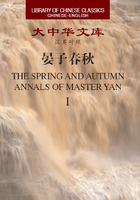
第三卷 问上
3.1 [51] 庄公问威当世服天下时耶晏子对以行也
齐庄公问威震当世使天下归服是不是因为天时,晏子回答是因为德行
【原文】
庄公问晏子曰:“威当世而服天下,时耶?”晏子对曰:“行也。”公曰:“何行?”对曰:“能爱邦内之民者,能服境外之不善;重士民之死力者,能禁暴国之邪逆;〔中〕听(赁)〔任〕贤者,能威诸侯;安仁义而乐利世者,能服天下。不能爱邦内之民者,不能服境外之不善;轻士民之死力者,不能禁暴国之邪逆;愎谏傲贤者(之言),不能威诸侯;倍仁义而贪名实者,不能威当世。而服天下者,此其道也已。”而公不用,晏子退而穷处。公任勇力之士,而轻臣仆之死,用兵无休,国罢民害,期年,百姓大乱,而身及崔氏祸。君子曰:“尽忠不豫交,不用不怀禄,(其)晏子可谓廉矣!”
【今译】
Chapter Three Queries—Part A
3.1 [51] DUKE ZHUANG ASKED WHETHER INSTILLING AWE IN ONE’S CONTEMPORARIES AND SUBJUGATING THE REALM DEPENDS ON AN OPPORTUNE MOMENT. YANZI REPLIED THAT IT IS A MATTER OF CONDUCT.
Duke Zhuang queried Yanzi as follow s: “Does instilling awe in one’s contemporaries and subjugating the realm depend on an opportune moment?”
Yanzi replied: “It is a matter of conduct.”
The Duke said: “What kind of conduct?”
Yanzi replied: “Whoever is able to love the people w ithin the state w ill be able to subjugate those who do evil beyond its border.[1] Whoever regards the death and toil of his officers and his people w ith due gravity w ill be able to suppress the w icked and subversive activities of aggressor states. Whoever pays heed to the upright[2] and employs the worthy will be able to instill awe upon the regional princes. Whoever rests content w ith humaneness and righteousness and delights in benefiting his contemporary generation w ill be able to subjugate the realm. [3] Whoever is incapable of love for the people w ithin the state w ill not be able to subjugate those who do evil from beyond it. Whoever regards the death and toil of his officers and his people lightly will not be able to suppress the wicked and subversive activities of aggressor states. Whoever is deaf to all remonstrations and is arrogant towards the worthy w ill not be able to instill awe upon the regional princes. Whoever turns his back on humaneness and righteousness and is greedy for fame and property w ill not be able to instill awe upon his contemporaries and subjugate the realm. This is the only way.”
But the Duke declined to put Yanzi’s advice into effect and Yanzi w ithdrew and lived in dire straits. The Duke employed officers for their courage and strength and took lightly the death of his m inisters and servants. He was perpetually engaged in warfare,the state was exhausted,and the people suffered as a consequence. A fter one year,the people were in great disorder and a disaster came upon the Duke in the person of Cui Zhu.[4]
The man of noble character said:[5] “Loyal to the utmost,he did not strive to maintain his relationship w ith the ruler. When his advice was not implemented,he was not preoccupied w ith his emolument. Yanzi can be called a man of integrity.”
注释
[1]Guanzi,8.1/58/6,parallel statement.
[2]中听→听中正之言也 (JS,174/2).
[3]This statement is most probably a critical reaction to the lesser status of 利—profit and 知—know ledge,which Confucius and Mencius commonly held inferior to 仁—humaneness. The Analects’ distinctive statement (Analects 4.2/7/7) that the humane person rests content in humaneness while the know ledgeable person profits from humanness (仁者安仁,知者利仁),is paraphrased here as a com p lementary rather than an antithetical statement. In other words,while Confucius of the Analects states that the know ledgeable person (知者) manipulate humanness for personal profit,Yanzi assigns an identical status to both 仁—humaneness and 利—profit by arguing that the “awe inspiring ruler” not only rests content in humaneness and righteousness,but also delights in unselfishly benefiting the entire realm.
[4]For Duke Zhuang of Qi 齐庄公,see above,n.3.
[5]For a detailed and refined analysis of the six occurrences of the statement “The man of noble character said” (君子曰) in the YZCQ,see David Schaberg,“Platitude and Persona: Junzi Comments in Zuozhuan and Beyond.” In Helw ig Schm idt-Glintzer,et al.,eds. Historical Truth,Historical Criticism,and Ideology: Chinese Historiography and Historical Culture from a New Comparative Perspective. Leiden Studies in Comparative Historiography 1. Leiden and Boston: Brill,(2005): 177-96.